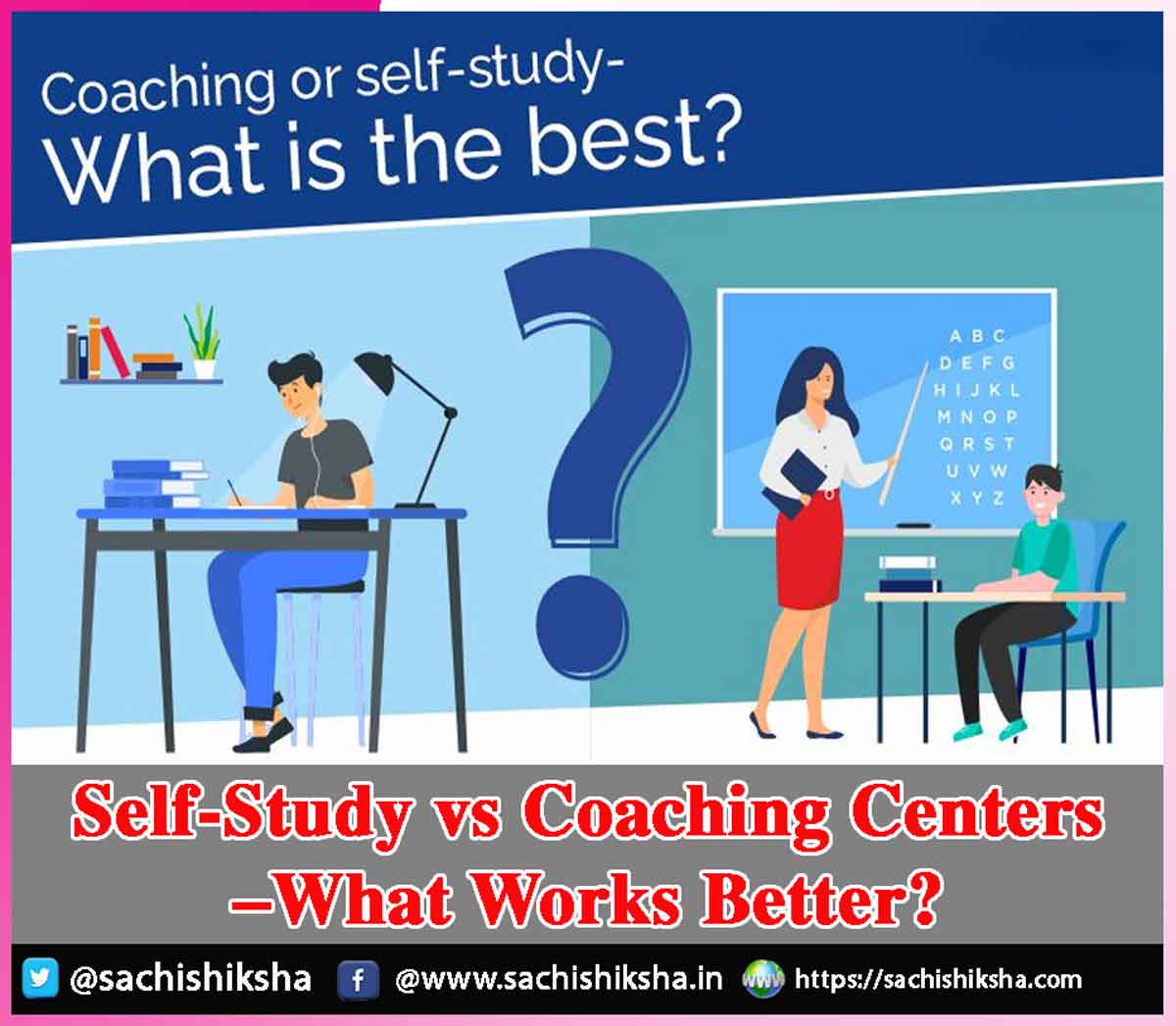Self-Study vs Coaching Centers – What Works Better?
Introduction: The pursuit of academic success, particularly in competitive exams and higher education, often brings students to a crucial crossroads: should one rely on self-study or enroll in a coaching center? Both approaches have their champions and critics, and both have proven successful under different circumstances. The effectiveness of either largely depends on the individual’s learning style, discipline, goals, and resources. This essay explores the pros and cons of self-study and coaching centers, and ultimately argues that the “better” choice is situational rather than absolute.
Table of Contents
Understanding Self-Study

Advantages of Self-Study
- Flexibility and Convenience
One of the most significant advantages of self-study is the flexibility it offers. Learners can study at their own pace, choose their preferred study time, and modify their schedules according to personal convenience. This flexibility is particularly beneficial for students who are juggling other responsibilities like part-time jobs or family obligations. - Cost-Effective
Self-study is often more economical than coaching centers. While some investment may be required for books, online subscriptions, or test series, the cost is significantly lower than the fees charged by formal coaching institutions. - Personalized Learning
Every individual has a unique learning style. Self-study allows students to adopt strategies that suit them best—be it visual learning, auditory inputs, or kinesthetic methods. They can focus more on weaker areas and skim through the topics they already understand. - Development of Discipline and Time Management
Successful self-study demands high levels of self-discipline, motivation, and time management. These qualities, once developed, benefit the learner far beyond academics, aiding in personal and professional spheres.
Challenges of Self-Study
- Lack of Guidance
Without a mentor or teacher, students may find it difficult to understand complex concepts. There is also the risk of studying outdated material or focusing on irrelevant topics, particularly for competitive exams. - Limited Peer Interaction
Self-study can be isolating. Interaction with peers often brings new perspectives, healthy competition, and emotional support, which are hard to replicate in solo study. - Motivational Hurdles
Without external accountability, students may struggle with consistency. Procrastination and distractions can significantly hinder progress.
Understanding Coaching Centers
Coaching centers are formal institutions that provide structured learning, typically for competitive exams like IIT-JEE, NEET, UPSC, CAT, and more. They follow a predefined curriculum and employ experienced faculty to guide students.
Advantages of Coaching Centers
- Structured Learning Environment
Coaching centers provide a well-organized learning environment with fixed schedules, syllabi, and deadlines. This structure can be particularly useful for students who struggle with time management. - Expert Guidance
One of the main reasons students opt for coaching is access to experienced faculty. These experts often provide shortcuts, tips, and exam strategies that are hard to discover on one’s own. - Updated Study Material
Coaching centers regularly update their study materials based on recent exam trends. This ensures that students are always learning the most relevant content. - Peer Learning and Competition
Being part of a batch helps foster a sense of competition and community. It offers a platform for group discussions, doubt resolution, and benchmarking one’s progress against peers. - Regular Testing and Feedback
Frequent mock tests and performance evaluations in coaching centers help students gauge their readiness. Feedback from teachers helps identify strengths and areas of improvement.
Challenges of Coaching Centers
- High Costs
Coaching centers, especially the reputed ones, can be expensive. The fees, coupled with travel and material costs, can be a burden for many families. - One-Size-Fits-All Approach
Despite the structured curriculum, coaching centers may not cater to individual learning styles. Students who fall behind or require additional help may not receive the personalized attention they need. - Time Constraints
Fixed class timings and long hours can sometimes leave students exhausted. This may reduce the time available for self-study and revision. - Pressure and Burnout
The competitive atmosphere, coupled with high parental expectations and peer pressure, can sometimes lead to stress and burnout.
What Works Better? A Comparative Evaluation
To determine what works better—self-study or coaching—it is important to consider the nature of the exam, the individual learner, and available resources.
For Disciplined and Self-Motivated Students
Self-study can be highly effective for students who are self-motivated, disciplined, and capable of planning their schedules. With the availability of abundant online resources—lectures, test series, forums—self-study is now more feasible than ever. It is also a preferred choice for students in remote areas without access to good coaching centers.
For Students Needing Structure and Support
Coaching centers are ideal for students who benefit from structured guidance, frequent testing, and expert mentorship. They are particularly helpful when the syllabus is vast, the competition is intense, and the exam pattern is complex. In such scenarios, the techniques and insights provided by experienced faculty can be a game-changer.
Hybrid Approach: The Best of Both Worlds
In recent years, a hybrid approach has emerged as the most balanced strategy. Many students attend coaching for core concepts and guidance but supplement their preparation with self-study and online resources. This ensures the benefits of both systems: structured support and personalized learning.
The Role of Technology in Bridging the Gap
Digital platforms have significantly altered the educational landscape. With platforms like YouTube, Coursera, Khan Academy, Unacademy, and others, high-quality education is now accessible at the click of a button. Recorded lectures, live classes, online doubt-clearing sessions, and AI-driven analytics offer many of the advantages of coaching centers at a fraction of the cost. For many, this has blurred the lines between self-study and guided learning.
Conclusion
In the debate between self-study and coaching centers, there is no one-size-fits-all answer. Both have their merits and limitations. The right choice depends on the student’s personality, goals, financial situation, and access to resources. Self-study empowers students to take ownership of their learning, fosters critical life skills, and is cost-effective. Coaching centers provide expert guidance, structured learning, and competitive exposure.
Ultimately, the most successful students are those who understand their strengths and craft a learning path that combines discipline, curiosity, and adaptability. Whether through self-study, coaching, or a blend of both, the key to success lies in consistent effort, smart strategy, and the willingness to learn and grow.














































